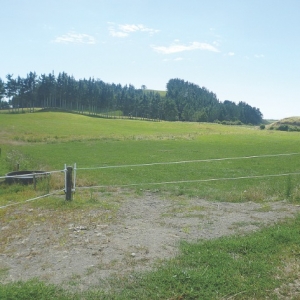Ross and Suzy Bolton took over the family farm in 1990 when it was a 157ha sheep and beef unit. They converted it to dairying the next day.
They started with a 26-aside herringbone dairy shed milking 320 Friesian and Friesian cross dairy cows. The farm has now grown to 397ha flat to rolling with 15ha of trees and some of the steep sidlings fenced for dry stock.
“Each year we seemed to be extending the farm dairy shed or buying more land.”
They now milk 800 cows and production this season will be 280000kgMS through a 54bail rotary.
With the conversion they re-fenced the whole farm to suit dairying and on his first day bought 200 Taragates with the 20mm tape with 10 stainless steel strands. He says he liked them then and has always preferred the brand and its products.
Bolton says gates bought in 1990 are still going strong. He likes their cost-effectiveness compared to steel gates – especially no need for heavy strainers. He uses steel gates at boundaries only, because the law requires them.
With two or three per paddock Bolton believes he is now using about 700 Taragates on his properties. Many of his lanes and gates are up to 8m wide and the Taragates are easily made to fit.
The farm was previously run by Bolton and four staff; now he has passed the management to the Taratahi training scheme.
“We had a good farm and facilities which were ideal for training younger people considering making a career in dairy farming.”
The farm now has a manager/tutor, a herd manager and two staff. And there can be up to seven students to listen and learn with some class room time. They are also taught life skills such as cooking, meal plans and ironing.
“From what I have seen so far the scheme is turning out some good students.”
















